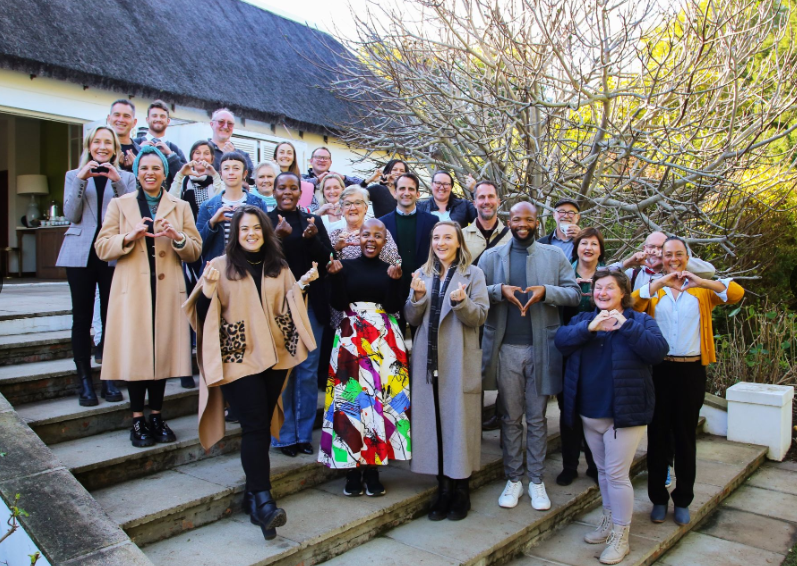Integrating Climate Actions into ECD
27 Sep 2024
As the climate crisis escalates, its impact on vulnerable populations, especially young children, becomes increasingly pronounced. Yet, these children represent our greatest hope for building a resilient future. By placing children at the forefront of climate action, we not only address the immediate needs of those most impacted by environmental crises but also invest in the long-term health, education, and social outcomes that will shape our collective future.
The UNICEF report Time to Act: African Children in the Climate Change Spotlight, found that children in 48 of the 49 African countries for which data are available are at ‘high’ or ‘extremely high’ risk from the extreme weather, illnesses, pollution, and environmental degradation caused by climate change. Research has shown that children who receive quality care and grow up in healthy environments are more resilient, better equipped to handle adversity, and more likely to contribute positively to their communities. The foundation of a sustainable society is built on the well-being of its children, making it imperative that we prioritize their needs in our climate response strategies.
Integrating a climate-resilient approach into the Foundation’s deep dive community initiatives enables us to build more into our ‘Everyone Gets to PLAY’ model and provide better care for our young children today in order to foster a generation capable of leading sustainable change.
The power of partnerships in building climate resilience
At the heart of our work is collective action and the approach taken to climate action is no different. The complexity of the climate crisis requires a collective response; no single organisation can address the challenge alone. Integral to our climate work is our partnership with our global partners, most crucially US-based think tank Capita, which has facilitated sharing best practices, insights on effective strategies for integrating solutions, and bringing together diverse stakeholder groups.
In December, we joined Capita on the global climate stage at the UN’s 28th Conference of the Parties (UNFCCC COP28) at the inaugural Greening Education Hub hosted by the UAE Ministry of Education and Abu Dhabi Early Childhood Authority. Our CEO, Warren Farrer and Joe Waters, Capita CEO were invited to sit on a multi-sectoral panel discussion addressing the intersecting challenges and solutions of climate change, early childhood education, and school readiness.
As a backbone organisation we are uniting organisations focused on climate resilience, ECD, community engagement, business, advocacy and policy, and research and innovation. This led to the creation of the South African Early Years Climate Action Alliance (SAYECAA), which DO MORE together with our ‘Dot Connector’ Nicole Biondi and Capita, launched in Cape Town in July 2024. The alliance calls for “the reimagining of every societal structure that supports children and families, from health and education to infrastructure and urban design, in responding to our evolving climate”.
In the face of the enormous challenges posed by climate change, we recognise that big change begins with small shifts that gradually gather momentum, leading to larger scale change.
Funda Egadini: An example of cultivating learning and climate resilience in ECD
Lulamaphiko’s Funda eGadini programme, an isiZulu phrase meaning "Learning in the Garden," is an organic food garden project rolled out in ECD centres in northern KwaZulu-Natal. Results from the 2023 Food and Nutrition Study conducted in KwaZulu-Natal indicate that 70% of households are food insecure, with Zululand being particularly susceptible.
Funda eGadini responds to this challenge at a practical level by supplementing children’s nutrition, integrating nature connections in early learning programmes to improve quality of outcomes, and promote environment-conscious agricultural methods in the community. This initiative is more than just about outdoor education; it’s about fostering a deep, lasting relationship between young children and the natural world – an essential foundation for climate resilience.
A second, unexpected benefit of the programme is that some ECD centres have gained increased financial security and sustainability by being able to sell their produce that is grown on site. The outcomes of this programme, as with all others DO MORE is involved in, are achieved through collective action as well as making the programme model and experiential learnings open source and adaptable to other cultural, developmental and geographical contexts.
For the upcoming financial year, DO MORE, in partnership with Biowatch South Africa and the Grindrod Family Centenary Trust, are supporting Lulamaphiko in expanding the programme beyond KwaZulu-Natal.
As we look to the future, the DO MORE FOUNDATION remains steadfast in its commitment to integrating a climate-resilient lens into our work with young children. By centering children in climate action, embedding sustainability into early childhood education, and forging powerful partnerships, we are building a more equitable world that works for all and builds a more sustainable and resilient tomorrow.
